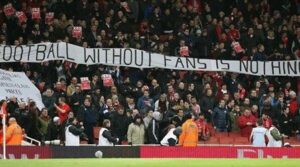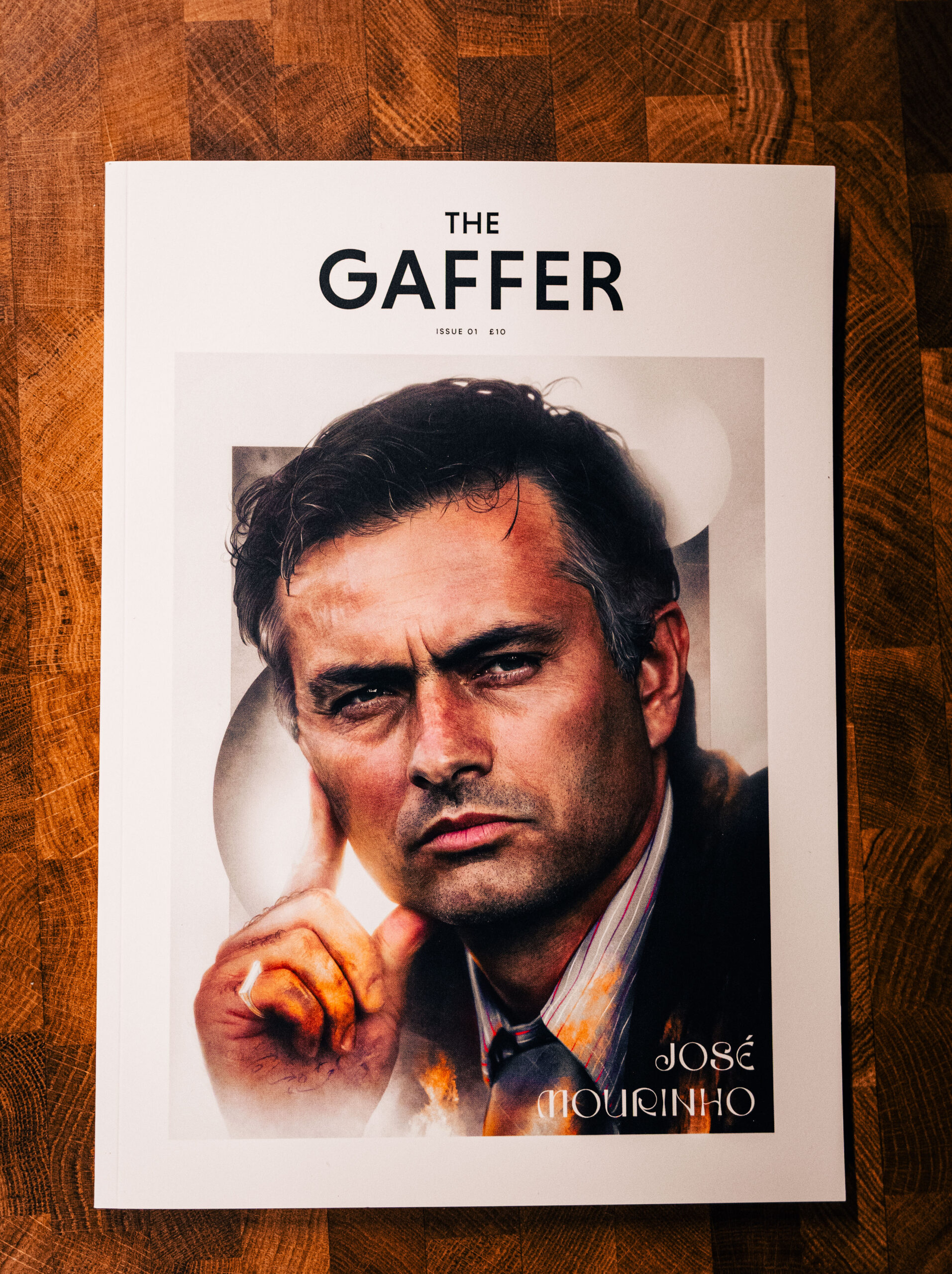“Football without fans is nothing.”
This slightly abridged version of a quote from the late, great Jock Stein, has become a familiar sight on banners being unfurled at various games across the globe as fans protest against their evolution from supporters to something resembling mere customers due to the rise of commercialisation over the last couple of decades.

With the sport originally gaining popularity amongst the private school elite, despite their best gatekeeping efforts it quickly became the passion of the working classes – who were beginning to make the most of their free Saturday afternoons that the bosses in the pit or the mills had been forced to give due to the 1850 Factory Act. The North-West was undoubtedly the footballing stronghold, with Lancashire (in the days before Merseyside had become a separate entity) providing half the founding members of the footballing league.
The reason for this was, undoubtedly, because it offered a means for escape.The population of the cities, towns and villages of Lancashire had swelled due to the influx of the working classes searching for labour – of which there was plenty to be had in the surrounding mills or down the pits. Dark, miserable, pitiful places to spend half your life, any opportunity to escape – however temporarily – would be gratefully clung onto – the reason alcoholism and drug addiction was so rife.
When the FA founded the Football League in 1888, football became a bonafide alternative. People couldn’t get enough. The aforementioned feeling of escape on a Saturday afternoon, of removal from your shitty job down the pit, instead feeling a sense of belonging and togetherness, uniting communities – regardless of race or religion, gender or nationality – is the addictive feeling that kept supporters coming back for more, week after week, and continues to do so. This is what makes football great, those values of passion, loyalty and sense of community amongst both players and fans alike.
See, whilst football is capable of producing beautiful moments, of which there have been many throughout the years, the real beauty is in the way football makes you feel. There will be adrenaline-fuelled moments of ecstasy and elation, and there will be times to wallow in misery, grief and despair. But you’ll all feel it together. Whilst this is all still true, there are some fans that have begun to feel disillusioned with the game – feeling that it is a far cry from the game in its truest form as the focus continues to shift further and further away from its roots. Once the game of the people, due to the growing greed and desire to make money from those in charge, football has now metastasised into a plaything for American billionaires, Arab Sheikhs and Russian oligarchs. Whilst it has always been impossible to have a completely level playing field, it was certainly closer to being aligned.
This is a sport that once it touches you, it becomes something that you live and breathe. But, as elite level football becomes rapidly more distant, everyday working-class people will continue to become ever more cynical. Fans are beginning to feel a real disconnect to the clubs that are the heart and soul of their communities, with local, working-class fans being priced out of attending matches in favour of those flying in on all-inclusive matchday packages.
This is exacerbated as the integrity of the game comes under question even further. ‘Alleged’ rapists bask in the adulation of thousands across the globe, not held accountable for their actions due to their talent with a ball. Countries that have beheaded over 80 people in the past year passed ‘fit and proper owner’ tests to be allowed to own football clubs, and fans are more than happy to turn a blind eye because they’ve splashed the cash on a Brazilian or two.

However, away from the limelight, the real heart of football continues to keep on beating away, keeping the game alive at the base of the football pyramid. Nowhere is this more evident than at the not-quite-so-little ‘World in One City’ tournament in Liverpool that has gone from strength to strength over the past couple of years.
Liverpool is a city renowned for its diversity and multiculturalism, shaped by centuries of immigration thanks in no small part to the famous docks. Whilst some arrived simply seeking work on the ships, or in local factories, others had fled persecution in their home countries and arrived dreaming of a better life. With a mix of first, second and third generation immigrants, there’s nothing as official as a ‘Grandparent ruling’ as enforced by FIFA.
Now in its third year, the tournament was the brainwave of Imad Ali who, together with mates Sam Goodall-Walker and Nabeel Salem – the three directors of World in One City – worked tirelessly to develop the idea from a thought into the festival of football it is today. Conversations begun during lockdown, with the intention of bringing together different communities from around Liverpool and giving local footballers the opportunity to represent their heritage nation, complete with national anthems being played before matches. The vision of the trio was for football to unify these communities whilst also celebrating their differences and identities.
Whilst the quality of the football on offer is of an excellent standard, it isn’t just this that has attracted supporters (with around 2500 people attending the final). The atmosphere at the games is electric, giving off vibes that you’d associate more with Carnival on the streets of Rio than a football match in England, with fans treated to the sight of dancers and drummers accompanying players onto the pitch, whilst local youngsters are welcomed and made to feel a part of the occasion – given flags and encouraged to start their own chants – rather than being looked at as a burden, or trouble-causers, as they so often are. Flares and pitch invasions are the norm, and whilst games certainly still have a competitive edge, respect and sportsmanship are evident in the aftermath.
(See the kids in full flow supporting Yemen Here).
Whilst you may have seen the Liverpool FC and Nivea video with Trent Alexander-Arnold, other famous faces have been down to watch the tournament with the likes of John Barnes, Nikita Parris and Bruce Grobbelaar in attendance, soaking in the atmosphere as sixteen different nations faced off in the tournament proper.
With the 2022 edition having culminated in a 1-0 victory for England over Rest of the World, both sides – along with fan favourites Yemen and the West Indies – were tipped as having the best chance of glory. The other countries to feature were Jamaica, Zimbabwe, Guinea Bissau, Brazil, West Indies, Somali Team, Nigeria, Congo, Bangladesh, Sudan, Poland, Libya and Ghana – with the likes of Ireland, Gambia, Portugal, Eritrea and Iran being seen off in the qualifiers.

The group stages treated us to a number of thrilling moments that will live long in the memory, with two ‘Goal of the Tournament’ contenders taking top spot. In the first, Congo had battled their way from 3-0 down against holders England to pull it back to 3-2, when Christopher Fankam picked up the ball deep inside his own half. He then skipped through not one, not two, but three challenges before unleashing a rasping effort into the far top corner – leaving the keeper with no chance. The celebrations that followed were worthy of a goal of that calibre, but the scenes paled in comparison of what was to follow, as Congo then went one better, grabbing a late winner to triumph 4-3, playing a big part in the much-hyped England failing to make it out of the groups, in typical English fashion.
(See the goal HERE)

The second occurred during a top of the table clash between Rest of the World and Yemen, two teams tipped to go all the way, with a victory for either side ensuring their progression as group winners. Yemen, having been trailing 2-1, had just grabbed themselves a last-minute equaliser, and the two teams looked set to share the points. That is, until insanity ensued. A Yemen winger was slipped through as ROTW piled forwards and was hauled down as he cut across the last defender. As the referee controversially waved away the appeals, ROTW keeper Neil O’Shea gathered the loose ball and took matters into his own hands. Striking the ball on the half-volley, O’Shea caught the Yemen keeper off guard with an extraordinary effort from the edge of his own area, leaving him in a heap in his net after a last-ditch attempt to prevent the late winner. Chaos ensued as O’Shea was mobbed in the corner by players and fans alike, whilst the Yemenis stood with hands on heads, unable to comprehend what had just happened. Far from rubbing salt in the wounds, however, ROTW captain Colyfa Kamara sung Yemen’s praises after the game, quite literally, through a bullhorn that had somehow worked its way into his hands.
(See the goal HERE)

Whilst ROTW then failed to progress through the Quarter Final stage, losing to Somali Team, they departed having left their mark– the uniqueness of O’Shea’s goal really emphasizing just how special the tournament is. West Indies, Guinea Bissau and Yemen were the other three sides to make it into the Semi Finals, with both matches taking place on a thrilling night on Jericho, with the chilling winds off the Mersey a stark contrast to the warm summer night the rest of the city was enjoying (with yours truly making the fatal mistake of turning up in just a T-shirt).
In the first clash, between West Indies and Somali Team, controversy struck again with the scores tied at 1-1. An admittedly soft penalty had been awarded for a nudge in the back in favour of Somali Team before the referee deferred the decision to his linesman who overruled his decision. With Somali Team left frustrated, their concentration slipped heading into the final minutes with the game looking destined for penalties. Akeem Campbell then capitalised on some lax defending with a composed finish, before tournament top scorer Leon Arnasalam converted a penalty moments later.
With West Indies securing their place in Sunday’s final, it was pre-tournament favourites Yemen against the impregnable defence of Guinea Bissau, who were yet to concede a goal from open play. The game played out as you might expect, with Yemen struggling to play the impressive football their fans had grown accustomed to thanks to Guinea Bissau’s resolute defending. With the game neatly poised at 1-1, Yemen’s Ameen Dubaily slotted home a free kick with just five minutes remaining, which would prove to be enough to see them progress.
With around 2,500 spectators packing out Jericho – just down the road from the L8 café at which the meeting with Trent took place – the West Indies and Yemen were greeted by a performance from Batala Mersey, a local drumming group performing Afro-Brazilian Samba, before the national anthems were played.
Both sides begun like a house on fire, seemingly intent on continuing to play the exciting free-flowing football that had carried them this far. A mistake from a West Indies defender halfway through the first half, pulling down the Yemen attacker, offered the fans favourites the opportunity to break the deadlock from the spot. Saeed Essa stepped up, but whilst his well-struck penalty was saved he maintained his composure to nod away the rebound.
There was a palpable sense of tension in the air for the second half, as West Indies pushed forward to grab an equaliser. They probed with intent before Ste Duke-Mckenna scored a rocket into the bottom corner after a quickly taken free kick. Once the celebrations had died down and play recommenced, the West Indies looked the more likely to grab the winner, and very nearly did, but were instead thwarted by the post just moments before the final whistle blew.
The already-pressurised circumstances of a penalty shootout were cranked up a notch as spectators spilled onto the pitch, forming a semi-circle around the penalty area. With the chanting, arm-waving and booing cultivating in a ferocious atmosphere, again and again players stepped up to take their penalties, with breaks after every other penalty as the volunteers-turned- stewards ushered the excitable, encroaching crowd back a few feet – which cannot have helped with the nerves. Eventually, the West Indies came out on top, slotting home the winning penalty to triumph 6-5, sparking yet another pitch invasion.
The trophy lift from the West Indies really encapsulated the spirit of the tournament, applauded by neutrals, players and supporters of a multitude of other nations and ethnicities alike, emphasizing the uniqueness of the togetherness and unity of those participating in the tournament and drawing the month-long festival of football to a close.
Whilst the World in One City tournament may be over for another year, it’s important that its legacy continues to leave an impact, promoting the fact that we are stronger together than we are apart. To respect and admire diversity in backgrounds, culture and ethnicity rather than demonising it – a message particularly paramount given the current Tory government intent on creating their culture of division, hatred and mistrust.

So, when it inevitably flashes up on Sky Sports News that the Saudi money is enticing increasingly bigger and better players by the promise of an inflated bank balance over the allure of glory, or that the latest oil state to try their hand at sports washing has decided to purchase your club on a whim, and you find yourself questioning what the point of it all is – dig a little deeper.
Take a glance towards the likes of the World in One City – and other grassroots and non-league footy – where the qualities that made us fall in love with football are still prevalent. Forget the bright lights and hundred-million-pound signings, wouldn’t you rather watch a tournament where the game is played with heart and emotion, by players motivated by loyalty and passion rather than pay checks? Where fans still feel a connection to players, with a sense of community and belonging, attendance valued and appreciated rather than simply being one of tens of thousands?
Before football loses its grip on reality for good, and we become fully disengaged – when the European Super League comes into fruition or some other such nonsense – have a think about the World in One City, and how it has (and will) continue to grow because it reminds us of exactly why we love this sport. The determination and drive of its creators, the sense of community, the unity, the diversity, the passion and the despair, and do as Jock Stein would have urged you to, and embrace the football that still truly appreciates its supporters. Because, as he said – and as the sport will inevitably see – without them, without us, it would be nothing.
This article comes to you from the team behind The Gaffer, where recently released Issue 1 is available to purchase here: https://thegaffer.bigcartel.com/product/pre-order-issue-1-the-gaffer-magazine





